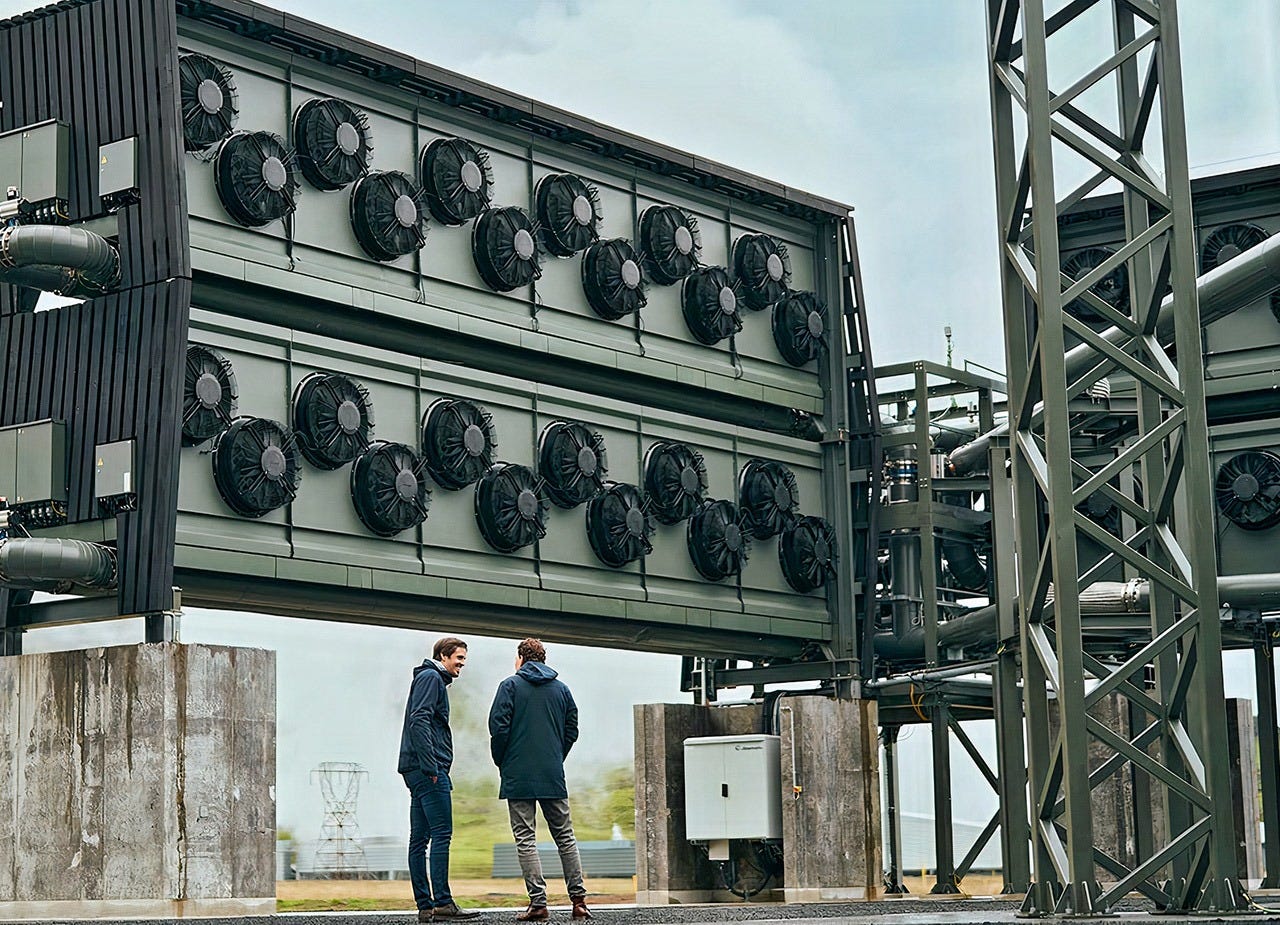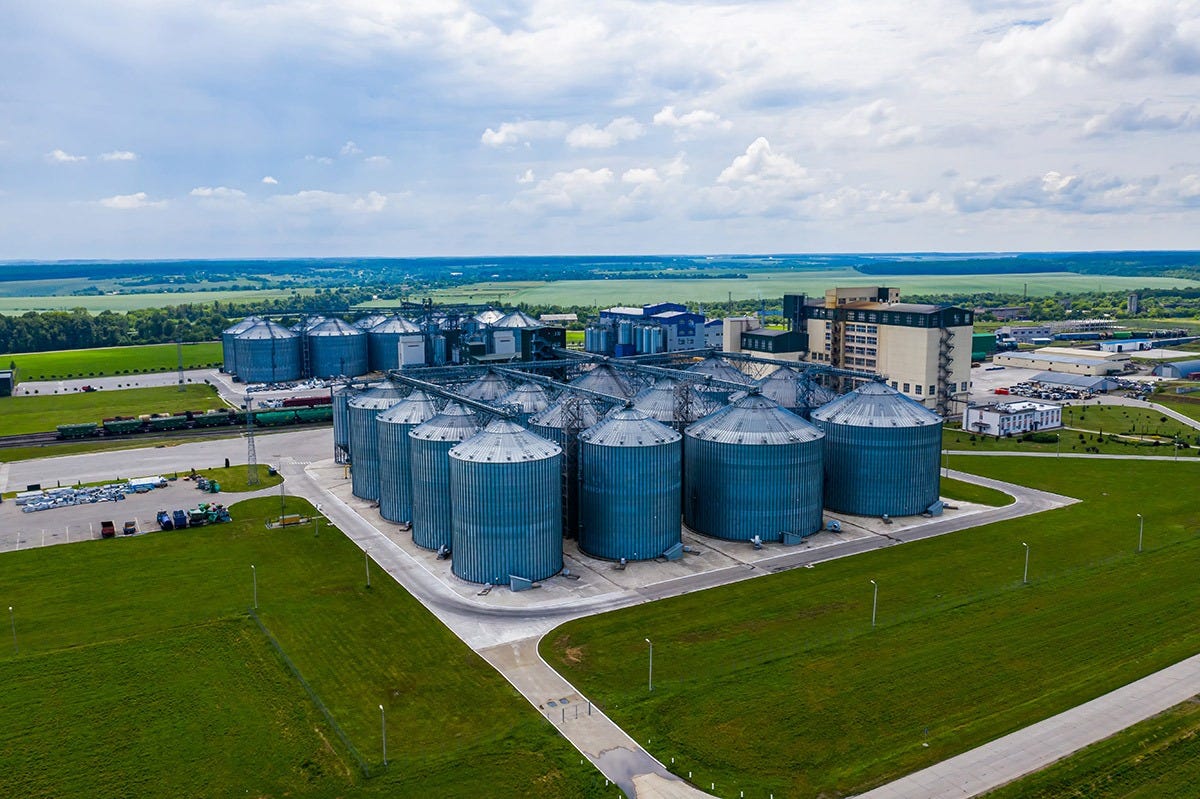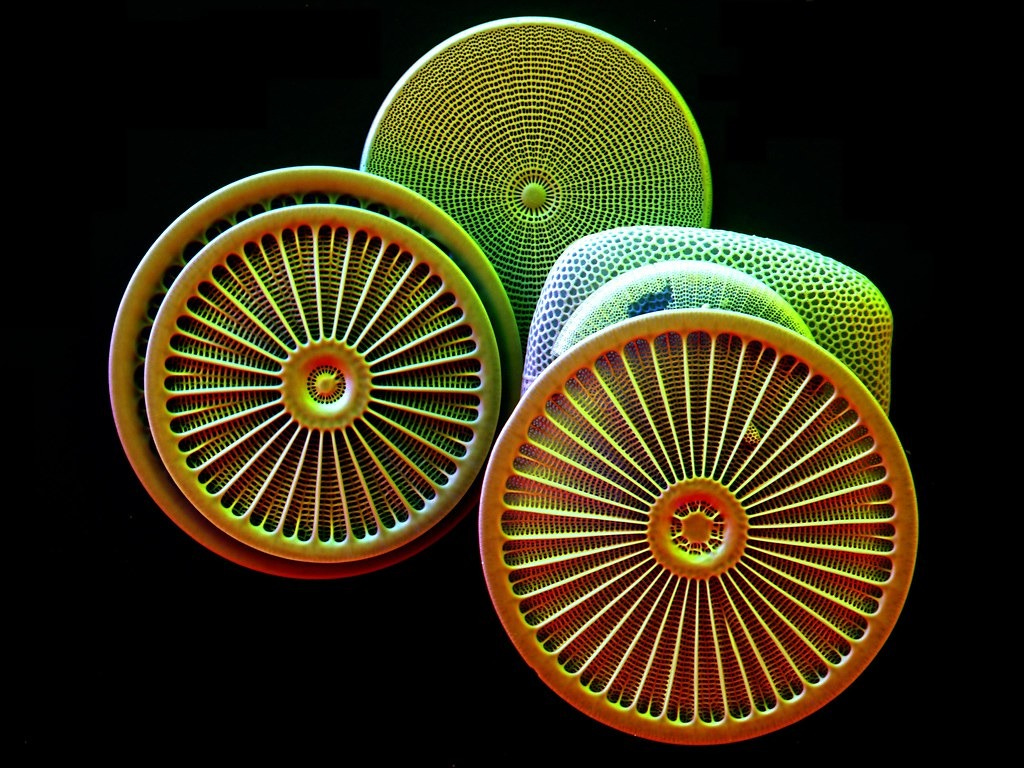Self-replicating CO2-eating nanobots. Really.
There's a lot of nonsense in the world of Carbon Dioxide Removals, but diatoms are the real deal.
Carbon Dioxide Removal (CDR) is in a strange place right now.
On the one hand, we can’t stabilize the climate without taking large amounts of CO2 out of the atmosphere. As far back as the Paris Agreement in 2015, it was apparent the NetZero math just wouldn’t work without big time CDR, which is why the agreement nods at the need to enhance carbon sinks.
On the other hand, CO2 is hard to remove at scale. The obvious methods —just plant trees!— won’t work: the problem’s so big, there’s not enough land on earth for the number of trees it would take. We need a much better idea.
The good news is that there are a lot of CDR ideas out there. The bad news is that few of them seem likely to work a scale.
A couple seem promising.
Just one, though, actually seems realistic.
In this post, I’ll briskly walk you through the CDR avenues that probably won’t work. Then I’ll tell you about the one that just might.
DAC: Direct Air Cul-de-Sacs

There are a lot — and I do mean a lot — of companies out there working on one big machine or another to suck CO2 out of the air, an approach known as direct air capture (DAC).
They get plenty of points for creativity. There are all kinds of bright engineers working on all kinds of sophisticated ideas. You’ve got guys out there trying to use a potassium hydroxide solution to trap CO2 through this mad Rube Goldberg machine that strings together an air contactor, a pellet reactor, a calciner, and slaker. You’ve got guys out there trying to use high-efficiency fans to pull air through ultra-high surface-area contactors with customized geometry and sorbents to optimize CO2 capture rates.
I’m no chemical engineer, and I’m not smart enough to evaluate each of these techniques on its merits. But that shit sounds expensive. I pray that I’ll be proved wrong. I’d be thrilled if one of these initiatives develops the killer tech that will achieve drastic learning-by-doing economies. I will be so glad to retract this post if that happens.
But right now DAC seems more likely to soak up seed capital than to reverse climate change.
Remember, humanity currently emits about 35 billion tons of CO2 per year. That’s handy: if you want to know how many billions of dollars it would cost to reach Net Zero instantly, you just take a technique’s cost-per-ton and multiply it by 35. That’s not always possible, because a lot of companies in this field are pretty cagey about their costs right now (because they’re high), and also because all of them swear up and down that once you scale, unit costs will come down dramatically.
Still, a rough order-of-magnitude idea of what DAC costs right now is in the high hundreds of dollars per ton. That means offsetting all current CO2 emissions using DAC would cost something in the tens of trillions of dollars per year, around 20-30% of global GDP, which is all a fancy way of saying it’s never going to happen.
I could be wrong. Plenty of very smart people are sure I am wrong, because cost curves are funny things. But at first sight, DAC is pie-in-the-sky stuff.
The Biomimicking Maybes: Bio-char and enhanced weathering

But there are other approaches. Some firms are working on things like bio-char and enhanced weathering (EW). The first would stabilize carbon in plants by turning it into literal charcoal, then sprinkling it on farmland. The second would accelerate naturally occurring rock weathering reactions by, basically, grinding basalt and spreading it on farmland. Both methods increase soil fertility. They sound a little bit less crazy to me, but they’re still expensive. And given the scale of the need, expensive rhymes with useless.
Bio-char and enhanced weathering techniques are cheaper than DAC, but not that much cheaper, and their prospects of getting cheaper quickly with scale are less bright. That’s because they rely on well-understood chemical processes that don’t appear to be optimizable with practice.
Lowest cost estimates range from around $35 per ton for EW to around a hundred at best for biochar. Cheaper than DAC, yes, but still trillion-dollar plus solutions if you were to scale them.
My rule of thumb is kinda simple—just turn the Baku slogan upside down: Billions, not trillions. Realistically, we don’t have the political capital to mobilize trillion-dollar investments for this stuff. To make it real, we need a way to store carbon for less than 10 bucks a ton. Preferably a lot less.
As far as I know, there’s just one technique we know that could possibly get there.
I gotta warn you, though, it’s pretty out there.
Self-replicating solar-powered CO2-eating nanobots
Imagine a huge swarm of machines designed to absorb carbon dioxide before self-destructing. They’d have to be able to make copies of themselves and they’d have to run on abundant, free energy. They would have to work in all kinds of conditions, from very hot to very cold, and you’d need them to be long-lasting and resilient. And you’d need an insane number of them —septillions, that is 10^24 or so— each absorbing a miniscule amount of CO2 before self-destructing and locking it away.
Ideally you’d want these machines to also perform other ecosystem services too, like sustaining the lifeforms around them. Needless to say, you’d need thems to be basically free to begin with and very cheap to scale up.
That’s all sci-fi nonsense, right?
Nope.
Nature solved this problem already.
They’re called diatoms: microscopic organisms courtesy of evolution.
There’s no need to deploy them, they’re pretty much everywhere already.
Take a water sample from any puddle, stream, river, lake, sea, or ocean pretty much anywhere on earth and you can be sure it’ll have hundreds of millions of diatoms per teaspoon. Dip your teaspoon in the ocean during a diatom bloom and you’ll find a lot more than that.
Diatoms are single-celled photosynthesizers: quite literally solar-powered CO2-eating nanobots. They’re not a species but a hugely varied class — nobody actually knows how many diatoms species there are, but scientists guess maybe 200,000. We seldom think of them, because we can’t see them without a microscope. But we know the oxygen in one out of every five breaths you take, was released by a diatom.
Diatoms have one fun property that sets them apart from other kinds of plankton: they come encased in a rigid membrane called a “frustule” made out of silica which you can think of as bio-glass. Technologists have spent years studying diatoms because frustules would be amazing to replicate in a lab. But for us the relevant bit is that they make diatoms less buoyant, so when they die, they tend to sink to the bottom of whatever body of water they’re in (unless something eats them first.)
Sinking diatoms are one of the main ways the planet naturally takes CO2 out of circulation. Tidily locked away in its frustule, a CO2 molecule at the bottom of the sea is out of the game for 100,000 years or more, until some geological process puts it back in the air.
Of all the CDR methods under discussion, trying to stimulate diatom growth seems like the one most likely to scale. Because though diatoms are ubiquitous, they’re not found in the same concentrations everywhere. Large parts of the ocean, especially away from coasts, have strangely low diatom concentrations. Those patches of ocean turn up in satellite images as dark blue patches. They’re dark because nothing photosynthesizes there, so they sustain little marine life in general.
That stands to reason: phytoplankton (single-celled photosynthesizers) are at the top of every marine food chain. Without phytoplankton, the slightly bigger zooplankton have nothing to eat, and then the krill have nothing to eat, and the little fish, and the big fish, and so on and so forth up to the whales.
If you could just stimulate phytoplankton growth in those patches of ocean, you’d not just bio-sequester a bunch of CO2, you’d also breathe marine life into large chunks of ocean that now have little.
The neat thing is that this would be relatively easy and cheap to do.
Marine biologists are now pretty clear on why so many patches of ocean harbor little life: there’s no iron in the water. Trace quantities of iron are needed for phytoplankton growth. Oceans usually get iron from dust blowing from nearby land. Get far enough away from land, and there’s just no iron. No iron means no phytoplankton. No phytoplankton means no life.
To sustain diatoms specifically, a second critical mineral might also come into play: silica, which they need to make those bio-glass frustules. Thankfully, both iron and silica are dirt cheap — literally: both are abundant in plain old dirt. Plus you don’t need that much of either to produce large increases in CO2 sequestering diatoms.
This, to me, seems by far the most promising CDR avenue.
To be sure, it’s not problem free —nothing ever is. In particular, it’s really not clear how much of the CO2 a diatom bloom captures ends up actually sequestered at the bottom of the sea. Obviously, the same CO2 molecule can’t be in two places at once: either it’s sinking down to the depths to be locked away or it’s tucked in a larger marine organism’s gut, in which case it’s on its way back out to the atmosphere.
Measuring how much CO2 ends up where is tricky: in some circumstances, as little as 1% of the CO2 diatoms absorb will end up permanently locked away. Some researchers believe if you target your iron at downwelling eddies —places where marine weather tends to suck water down into the depths— you can increase that proportion substantially. But that’s just a theory.
And look, any time you are proposing large-scale changes to any biological system, there’s the potential to screw things up. Any diatom-based CDR initiative is going to have to carefully monitor its downstream effects. Some marine scientists worry phytoplankton blooms could draw nutrients from neighbouring patches of ocean, robbing Peter to pay Paul in ocean fertility terms. Others have expressed concern that too large a bloom could create problems with ecosystems at the bottom of the ocean, if too much sediment falls on it too quickly and starves it of oxygen.
But these all seem like the kind of problem that a well-funded effort could, in principle, solve. And that would be a big deal, because unique in the world of CDR, these kinds of techniques appear to be cheap enough to make scaling feasible.
A U.S. National Academies of Science report from 2022 found that about 40 cents worth of iron fertilizer can stimulate the growth of enough diatoms to capture a ton of CO2 — not 40 dollars, mind you, 40 cents.
Of course, once you factor in the costs of the ships to deliver the nutrients, and the cost of monitoring, reporting and verification, the all-in cost of bio-sequestration isn’t going to be 40 cents a ton.
But it could end up being 20 or 25 times higher than the cost of the iron and still come under the $10/ton threshold that, to my mind, represents the dividing line between reality and fantasy in the CDR world.
We don’t, of course, know if any of this would really work at scale. To find out we’d have to test it. And we need to test it, because the prize, if it comes, is tantalizing: Net Zero that we can actually afford not at some point in the far off future but now. Within ten years. Soon enough to make a difference.
Imagine the cultural impact that would have.
Imagine what our climate conversation will look like if atmospheric CO2 stops rising by, say 2035, just because we found a way to feed the top of the ocean foodchain.
It would be one of humanity’s greatest ever achievements.
It would be insane not to try.



The scientific debate over iron fertilization started over 35 years ago. A fair amount of both lab and field research into this question has been conducted over those years, but virtually all of the biological oceanographers I’ve met remain pretty skeptical it would work as intended.
Diatoms are only one of many types of phytoplankton (microscopic algae) in the ocean, and all of them need iron and will vigorously compete for it; but those other types will essentially be “weeds” that will take root in the imagined diatom farm, consuming fertilizer, but not sinking out nearly as well, because they lack the heavy silica frustule.
It’s also relevant to know that tiny things sink very slowly (on the order of centimeters per hour), even when they are significantly heavier than water, which gives bacteria lots of time to gobble up the organic carbon you hope to sequester and convert it back to CO2 near the ocean surface. Keep in mind, the bottom of the ocean averages several kilometers deep, so that is a very long trip down for a dead diatom (months to years) whereas bacteria can consume the carbon in hours to days.
But the greatest potential objection is the ecological one. All life on Earth ultimately depends on the health of the oceans, which are 71% of the surface of our planet. The scale of ecological change needed to produce the desired level of carbon sequestration (assuming that part even worked) would be by far the largest scale ecological modification of the planet ever undertaken by humans. It would dwarf all agriculture, logging, and urban development by an order of magnitude.
We have no idea what the unintended consequences of all that would be, but there most assuredly would be many of them. The projected sea level rise of the next few hundred years due to climate change could be a minor annoyance compared to the long lasting impacts of runaway ecological changes triggered by something at this scale. We only have one Earth, and this would be an enormous experiment that could cause sudden shifts in global ecosystems leading to mass extinctions and other irreversible harms. It could also be fine, but the only way to find out for sure would be to do it to our one and only planet and find out.
Or that’s the widely shared concern among the people who study these ecosystems: that the medicine (the impacts of irreversibly messing with the ecosystem of 71% of the surface of the planet) could be worse than the disease (CO2 driven climate change).
For some approachable info on the genesis of this debate, you should really read about John Martin. These are not new ideas, people,have been debating them for literally decades. NASA has an informative intro here:
https://earthobservatory.nasa.gov/features/Martin
What you want is something that turns the extracted CO2 into something useful like, say alcohols or methane. Then it can replace fossil fuels in all the places where we use them today and we stop using the fossil fuels